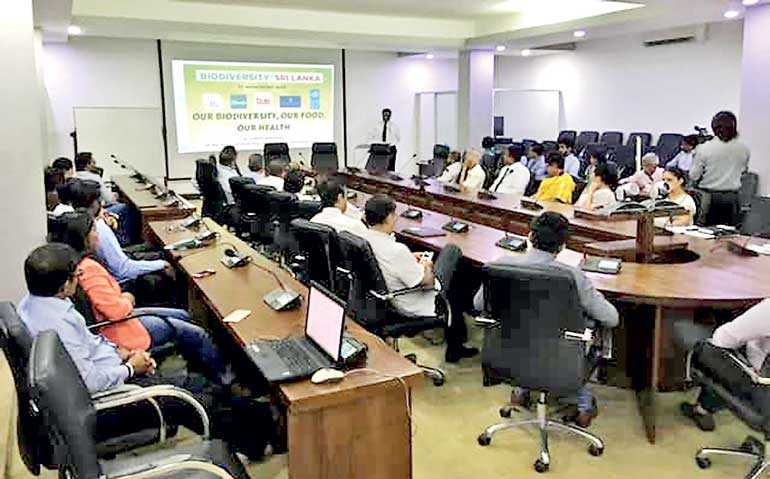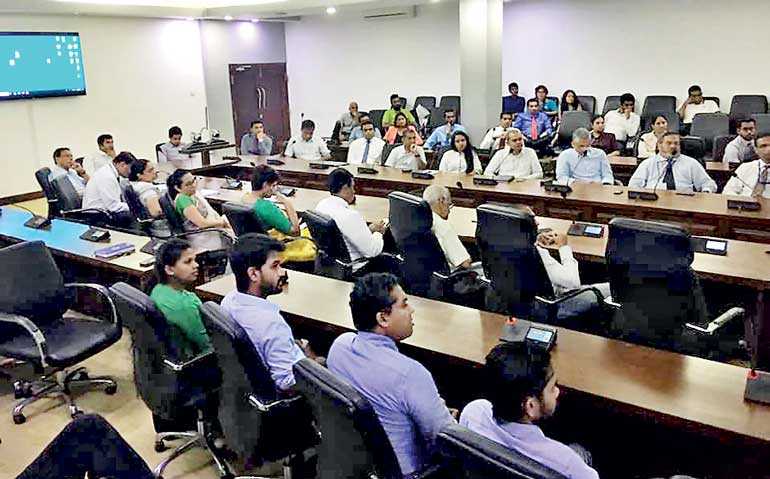Friday Feb 20, 2026
Friday Feb 20, 2026
Tuesday, 18 June 2019 00:00 - - {{hitsCtrl.values.hits}}


In commemoration of the International Day for Biological Diversity (IDB) 2019, Biodiversity Sri Lanka, together with its member companies from the agribusiness sector and with the support of its Associate Member – the United Nations Development Programme, hosted a technical learning event titled ‘Our Biodiversity, Our Food, Our Health’ recently.
Sustainable and innovative practices of BSL member companies were shared with a wide spectrum of interested persons at this event. Delivering a presentation on biochar – the sustainable solution to healthy soil and productive ecosystems, Asanka Abayakoon, Manager, Dilmah Conservation highlighted the benefits of application of biochar for sustainable agriculture based on an old practice re-discovered not only as agricultural technology but also as a global warming mitigating factor, and an alternate for fossil fuels.
Biochar is a type of highly porous charcoal made by pyrolysis of organic feedstock, which improves physical characteristics of soil, enhancing its nutrient retention and water holding capacity, increases plant biomass and the soil carbon pool, absorbs toxic compounds, and is also capable of carbon sequestration. Other benefits include improving soil microbial activity and reducing methane and no emissions. Dilmah started applying this soil enhancer to its tea estates in 2010, which resulted in a remarkable 42% increase in yield within three months. Dilmah uses tea waste to produce biochar which has reduced fertiliser inputs by 50% and increased leaf yield by 40%.
From Dole Lanka Ltd., Tharindu Haputhantri, Research, Environment and Business Development Manager, presented on their herbicide-free sustainable weed management system referred to as the ‘Chena Project’. With the ban of Glyphosate in 2015, weed control in banana plantations became a challenge for Dole for which by way of solution, a manual weeding system, a concept generated from oil palm cultivations in Central America, which had proven to be effective has been introduced.
Each ‘chena’ which is 10 ha in extent, is divided into 2 blocks of 5 ha, with two workers where each worker cleans 1 ha per day. If the total area is successfully cleaned within the given period, the two workers will earn 20% of their monthly salary as an incentive. All the debris is placed in the intra-rows; the inter-rows are kept free from debris to prevent weeds arising. This method is environmentally sustainable as no agrochemicals are involved, and because it reduces soil erosion and enhances soil biodiversity.
In social aspect it is sustainable as people enjoy freedom of working flexible hours and gain financial benefits. Economically the company’s weeding cost has been reduced by approximately 10%, and the yields improved. In addition, maintaining a moderate level of grass in the inter-rows and leaving the debris in the intra-rows, has helped to reduce the pressure of pests and diseases; as a result product quality has improved thereby reducing wastage of produce. The project has proved that manual weeding can be made commercially viable and weed control can be done without the use of herbicides.
A joint effort by GreenKeepers Ltd. and Jinasena Ltd. towards ‘Zero Waste’ which was presented by Edward Fernando, Director, Green Keepers Ltd. enlightened the audience on the use of modern technology in composting of food waste. This innovative technology converts food waste into nutrient-rich compost in just 24 hours, utilising microbes and heat in an automated and odourless process. It comes in different models with capacities ranging from 5 to 1,500 kg to meet the composting needs of households to hotel complexes. The many benefits of this technology include up to 90% volume reduction of food waste, low labour cost (full operation can be accomplished by one person) and low maintenance; there is no secondary pollution or handling noise on-site, no wastewater and no landfill costs.
Presenting on CBL’s agro journey towards environmental and social sustainability, Randeewa Malalasooriya, CEO – Natural Foods Cluster, Ceylon Biscuits Ltd., stated that lack of new entrants and loss of productivity are the biggest problems in the agricultural sector. With respect to coconut cultivation, when prices drop with the impact of climate change, farmers struggle to maintain their plantations; CBL provides farmers with organic fertiliser and conducts awareness programs, also uplifting women farmers.
Another initiative of CBL is to boost the local honey production was also highlighted. About 70-90 tonnes of honey is imported to Sri Lanka while having all the favourable conditions for production of honey. The Bee honey project of CBL started in 2005 at a time when the number of people involved in bee farming dropped and the industry declined.
The gathering was certainly inspired by the interesting presentations made and the useful information shared in the discussion that followed, on sustainable practices in line with the theme ‘Our Biodiversity, Our Food, Our Health’.